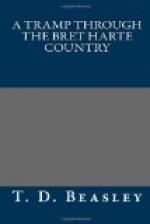I was seated on the porch of the store at Applegate, disposing of a frugal lunch consisting of raisins and crackers, when my friend hove in sight. After a private inspection of the store’s possibilities, with a little smile, the meaning of which I well understood from many similar experiences, he sat down beside me and without a word tackled the somewhat uninviting repast, to which with a wave of the hand I invited him. I may say here that Mr. Smith is a veteran and inveterate “hiker.” I doubt very much whether any man in California has seen as much of this magnificent State as he, certainly not on foot; as a consequence he is accustomed to a ready acceptance of things as they are. Applegate, about midway between Auburn and Colfax, is an alleged “summer resort.” It did not appeal to us as especially attractive, the view, at any rate from the road, being extremely limited and lacking any distinctive features. Without unnecessary delay, therefore, we resumed the march.
It is practically up-hill — “on the collar” — all the way to Colfax, as is plainly evidenced by the heavy railroad grade. About a mile short of the town, we made a digression to an Italian vineyard of note. There, at a long table under a vine-covered trellis that connected the stone cellar with the dwelling-house, we were served with wine by a young woman having the true Madonna features of Sunny Italy, her mother, a comely matron, in the meantime preparing the evening meal, while on the hard ground encumbered with no superfluous clothing, disported the younger members of the family. And as I sat and smoked the pipe of peace, I reflected upon how much better they do these things in Italy — for to all intents and Purposes, I was in Italy.
Colfax — before the advent of the C. P. R. R. called “Illinois Town” — is an odd blending of past and present; the solid structures of the mining days contrasting strangely with the flimsy wooden buildings that seem to mark a railroad town. We were amazed at the amount of traffic that occurs in the night. Three big overland trains passed through in either direction, the interim being filled in with the switching of cars, accompanied apparently with a most unnecessary ringing of bells and piercing shrieks from whistles. Since our hotel was not more than a hundred and fifty feet from the main line, with no intervening buildings to temper the noises, sleep of any consequence was an utter impossibility.
Few Californians are aware, probably, that a considerable amount of tobacco is raised in the foothills of the Sierras. At Colfax, I smoked a very fair cigar made from tobacco grown in the vicinity, and manufactured in the town.
I think we were both glad to leave Colfax. Apart from a nerve-racking night, the mere proximity of the railroad with its accompanying associations served constantly to bring to mind all that I had fled to the mountains to escape. Yet I cannot bring myself to agree with those who profess to brand a railroad “a blot on the landscape.” The enormous engines which pull the overland trains up the heavy grades of the Sierra Nevada impress one by their size, strength and suggestion of reserve power, as not being out of harmony with the forces of Nature they are constructed to contend with and overcome.




